Social Media Lawsuit Whistleblower Says Meta Knew of Impact
- Last Updated: June 12th, 2025

Attorney Jessie Paluch, founder of TruLaw, has over 25 years of experience as a personal injury and mass tort attorney, and previously worked as an international tax attorney at Deloitte. Jessie collaborates with attorneys nationwide — enabling her to share reliable, up-to-date legal information with our readers.
Legally Reviewed
This article has been written and reviewed for legal accuracy and clarity by the team of writers and legal experts at TruLawsuit Info and is as accurate as possible. This content should not be taken as legal advice from an attorney. If you would like to learn more about our owner and experienced injury lawyer, Jessie Paluch, you can do so here.
Fact-Checked
TruLawsuit Info does everything possible to make sure the information in this article is up to date and accurate. If you need specific legal advice about your case, contact our team by using the chat on the bottom of this page. This article should not be taken as advice from an attorney.
Key Takeaways:
- Whistleblowers can highlight potential ethical infringements within social media companies.
- Evidence from insiders can prompt broader discussions on industry regulation.
- Legal challenges may influence social media platforms' policies and practices.
Overview of the Social Media Lawsuit Whistleblower
On this page, we’ll discuss what a Social Media Lawsuit Whistleblower is, potential impact of a social media lawsuit whistleblower, how the whistleblower’s claims impact social media harm lawsuits, and much more.
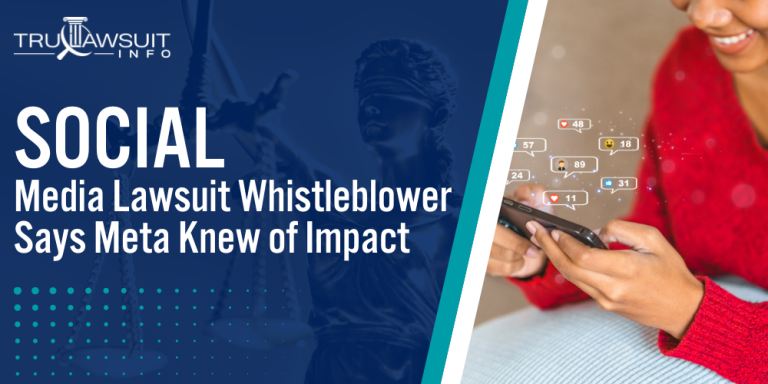
Intro to the Social Media Lawsuit Whistleblower
Some of the key aspects of the Social Media Lawsuit Whistleblower’s claims include, but are not limited to:
- Internal Research: The whistleblower alleges that Meta’s research showed the negative impact of its platforms on mental health, particularly among teenagers.
- Prioritizing Profits: Accusations suggest that Meta prioritized profits over user well-being by not adequately addressing its platforms’ harmful effects.
- Insufficient Action: The whistleblower claims that despite being aware of the issues, Meta failed to take sufficient action to mitigate the negative impacts of its platforms.
- Public Deception: Allegations indicate that Meta may have misled the public and regulators about its knowledge of the harmful effects of its social media platforms.
If you or a loved one has suffered mental health issues due to the use of social media platforms like Instagram, you may be eligible to seek compensation.
Contact Tru Lawsuit Info today using the chat on this page to receive an instant case evaluation.
Table of Contents
Evidence Supporting the Whistleblower's Claims
The credibility of a whistleblower is often established through various forms of evidence, ranging from their professional background to tangible documents and coworker testimonies.
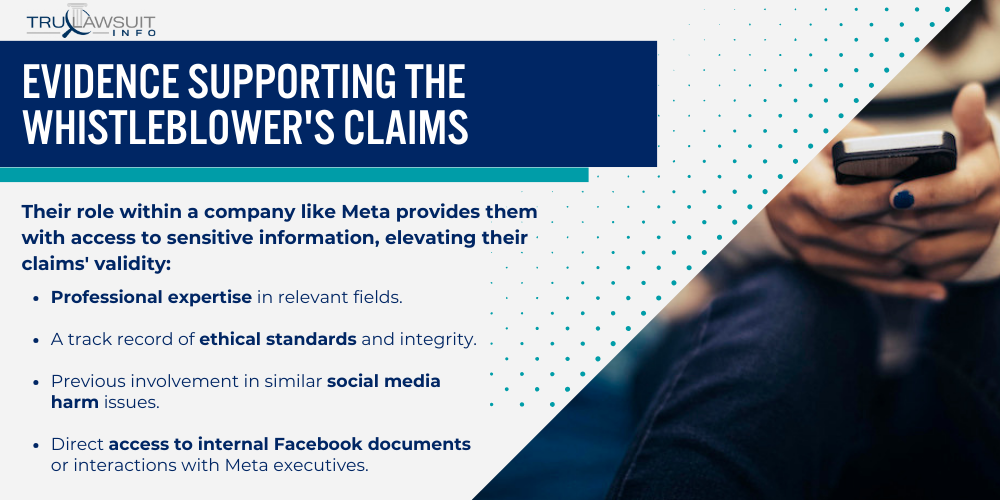
Whistleblower’s Background and Credibility
The whistleblower’s credibility heavily relies on their professional history and expertise.
Their role within a company like Meta provides them with access to sensitive information, elevating their claims’ validity:
- Professional expertise in relevant fields.
- A track record of ethical standards and integrity.
- Previous involvement in similar social media harm issues.
- Direct access to internal Facebook documents or interactions with Meta executives.
Internal Documents and Communications
Internal documents and communications are pivotal in substantiating the whistleblower’s allegations.
These may include emails, reports, and meeting minutes that correspond with the Facebook Files:
- Email exchanges among Meta executives discussing the social media lawsuit.
- Detailed reports illustrating potential harms caused by social media platforms.
- Meeting records that show deliberation over contentious policies.
- The Facebook Files themselves, which may contain revealing insights into the company’s practices.
Testimony from Other Employees
The support of coworkers can significantly reinforce the whistleblower’s stance.
Their statements provide an additional insight into the internal operations:
- Testimonies confirming the existence of related internal documents.
- Accounts of conversations with or actions taken by Meta executives.
- Observations of the company’s handling of social media harm.
- Shared experiences referring to the negative effects disclosed by the Facebook Files.
Meta's History of Controversies and Scandals
Meta Platforms, formerly known as Facebook, has faced numerous challenges and legal issues that have shaped its history and impacted its reputation.
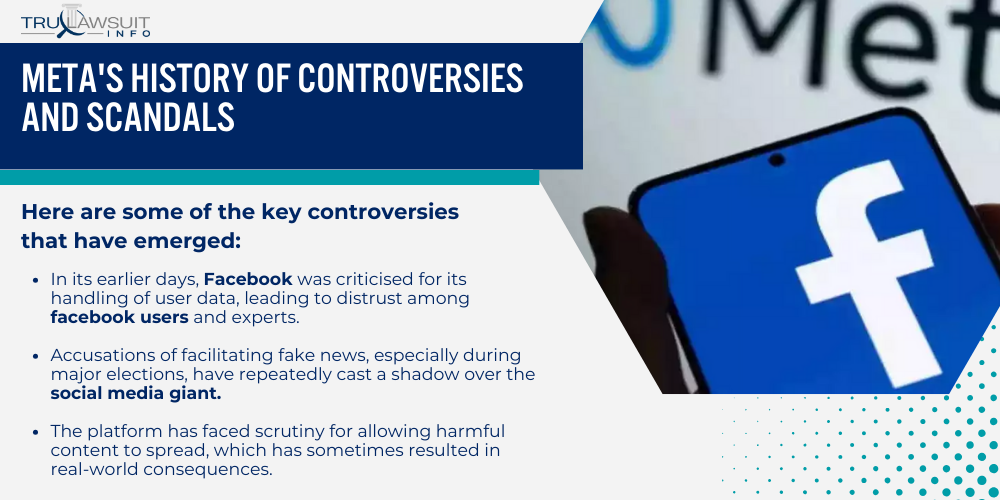
Previous Allegations of Misconduct
Meta Platforms has been at the center of various controversies, raising concerns about its practices and ethics.
Here are some of the key controversies that have emerged:
- In its earlier days, Facebook was criticized for its handling of user data, leading to distrust among Facebook users and experts.
- Accusations of facilitating fake news, especially during major elections, have repeatedly cast a shadow over the social media giant.
- The platform has faced scrutiny for allowing harmful content to spread, which has sometimes resulted in real-world consequences.
- Antitrust law issues have also been highlighted, as Big Tech companies like Meta were accused of stifling competition.
The Lawsuit Against Meta and Its Implications
The recent legal actions against Meta highlight a pivotal moment in discussing social media’s influence and responsibility.
This lawsuit underscored the growing concerns over how platforms manage user data and content, pushing for a reevaluation of digital governance.
A groundbreaking lawsuit against Meta brought its policies into sharp focus:
- Senator Richard Blumenthal and the Senate Judiciary Committee raised serious questions about Meta’s responsibility towards its users.
- This lawsuit, which involved allegations of knowingly allowing harmful content, sparked a larger debate about social media’s role in society.
- With mounting legal pressures, there was an increased call for regulation to ensure online safety, particularly for children.
- The proceedings of the Senate Judiciary Subcommittee underscored the potential need for new legislation, like the Kids Online Safety Act, to address these concerns.
Company’s Track Record on User Privacy and Safety
Meta has consistently faced scrutiny over its handling of user data, prompting several high-profile investigations and regulatory actions.
Despite these challenges, the company has made strides in enhancing security protocols and user control over personal information.
Meta’s record on privacy and safety paints a complex picture:
- It’s known that Facebook knew about certain loopholes in its privacy policy, yet it took years to address them adequately.
- Revelations about data misuse in scandals such as the Cambridge Analytica incident prompted demands for greater transparency.
- Implementing safety measures to protect user data has been a contention, triggering changes in the platform’s policies.
- Regular reports on policy updates exhibit the company’s efforts to improve, although they often follow public criticism or legal challenges.
Impact of Social Media on Mental Health and Society
Social media platforms significantly influence mental health and societal norms, particularly among young people and teen girls.
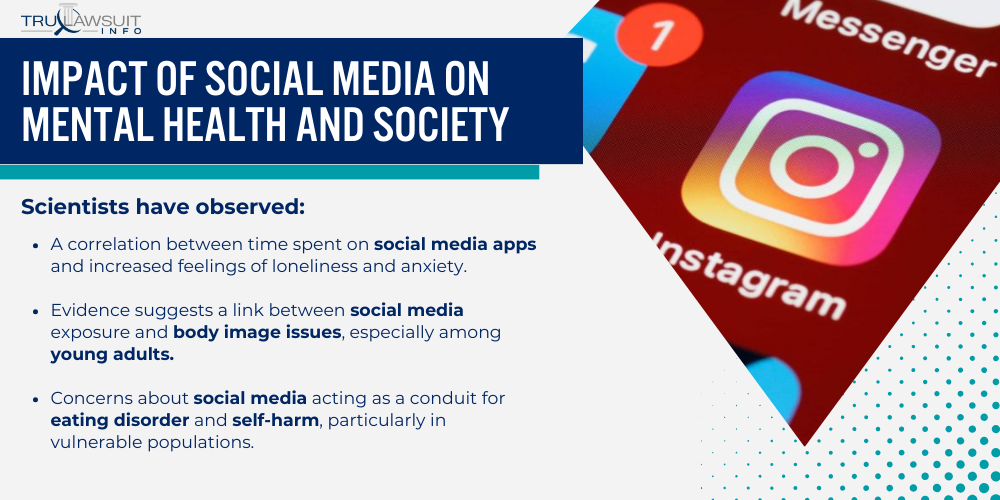
The intricate relationship between social media use and various mental health issues has spurred much research and debate.
Research on the Effects of Social Media Use
Research indicates that heavy social media use can lead to negative psychological outcomes.
Scientists have observed:
- A correlation between time spent on social media apps and increased feelings of loneliness and anxiety.
- Evidence suggests a link between social media exposure and body image issues, especially among young adults.
- Concerns about social media acting as a conduit for eating disorder and self-harm, particularly in vulnerable populations.
- There is a necessity to protect young users online, as those who spend significant amounts of time on these platforms can struggle with their mental health.
Concerns Raised by Experts and Advocates
Experts and advocates express concerns about the potential risks associated with social media.
They stress the need for:
- The creation of safe spaces within social media apps to shield children from harm.
- Enhanced regulations to protect young users, including strategies for children’s online safety.
- Targeted interventions to support youth mental health, led by findings in instagram use research.
- Developing educational programs that highlight the risks of heavy social media use and promote healthier online behaviors.
Calls for Increased Regulation and Accountability
The landscape of digital communication is evolving, prompting legislators and public advocates to push for stronger regulatory measures.
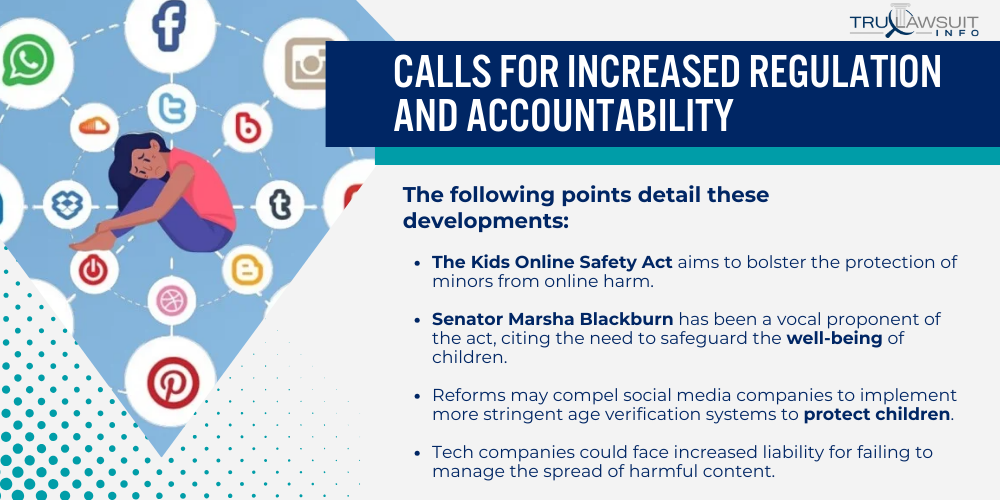
These initiatives are intended to enforce greater accountability on the part of social media companies and big tech firms for the content circulating on their platforms.
Proposed Legislative and Policy Changes
Legislators on Capitol Hill are drafting proposals for new laws that target the mechanisms of social media platforms.
The following points detail these developments:
- The Kids Online Safety Act aims to bolster the protection of minors from online harm.
- Senator Marsha Blackburn has been a vocal proponent of the act, citing the need to safeguard the well-being of children.
- Reforms may compel social media companies to implement more stringent age verification systems to protect children.
- Tech companies could face increased liability for failing to manage the spread of harmful content.
Advocacy Groups Demanding Action
Advocacy groups have been steadfast in their call to action, pressuring big tech and the federal government for immediate change.
We see their demands outlined below:
- They insist on enhanced transparency regarding algorithms that may be harming children.
- Groups demand a clear stance from top executives in ensuring online safety.
- There is a strong push for platforms to allow independent audits of their content moderation practices.
- These groups argue for the creation of an oversight body dedicated to the regulation of social media content.
The Role of Whistleblowers in Tech Industry Oversight
Whistleblowers in the tech industry have proven essential in highlighting unethical practices and advocating for better corporate governance.
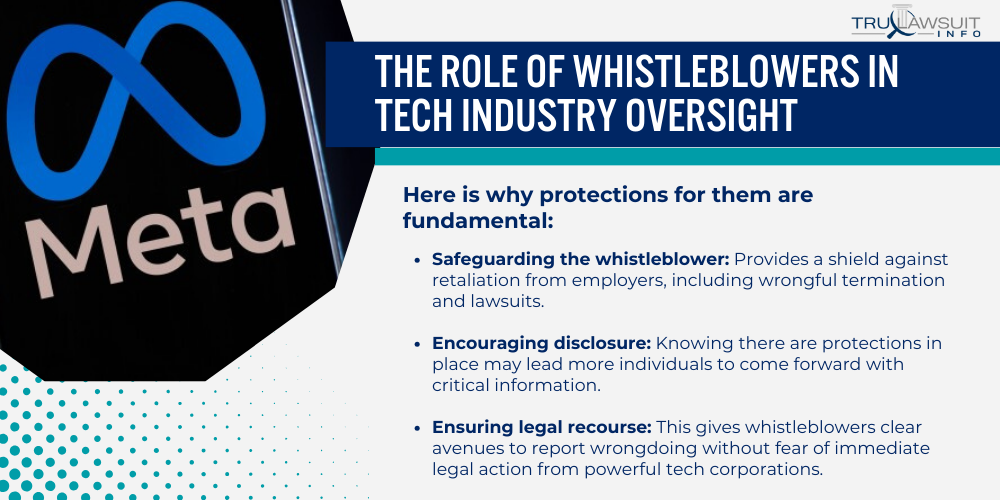
Their actions have led to increased public scrutiny and demands for transparency across tech giants like Facebook and Google LLC.
Importance of Whistleblower Protections
These individuals often face significant personal risk when they choose to bring to light practices within tech companies.
Here is why protections for them are fundamental:
- Safeguarding the whistleblower: Provides a shield against retaliation from employers, including wrongful termination and lawsuits.
- Encouraging disclosure: Knowing there are protections in place may lead more individuals to come forward with critical information.
- Ensuring legal recourse: This gives whistleblowers clear avenues to report wrongdoing without fear of immediate legal action from powerful tech corporations.
- Promoting ethical business cultures: By having robust protections, companies are more likely to self-regulate and maintain higher ethical standards.
Encouraging Transparency and Ethical Conduct
Effective oversight of tech companies is partly dependent on transparency and the promotion of ethical behavior within these organizations.
Here’s how whistleblowers contribute to this aim:
- Exposing unethical practices: Instances like the meta whistleblower revealing the Facebook Files have shed light on how social media giants may prioritize growth over users’ well-being.
- Highlighting addictive features: There’s a conversation about how big tech companies integrate addictive features in products that may more harm users, especially minors.
- Free speech vs. Content moderation: The debate continues within platforms such as Meta, about balancing free speech with the need to moderate harmful content.
- Influencing policy decisions: Whistleblowers’ disclosures often lead to public and legislative scrutiny that can result in more stringent regulations for tech companies.
Trulawsuit Info: #1 Social Media Lawyers
Social media lawsuits have become increasingly prominent as the platforms themselves have woven into the fabric of daily life.
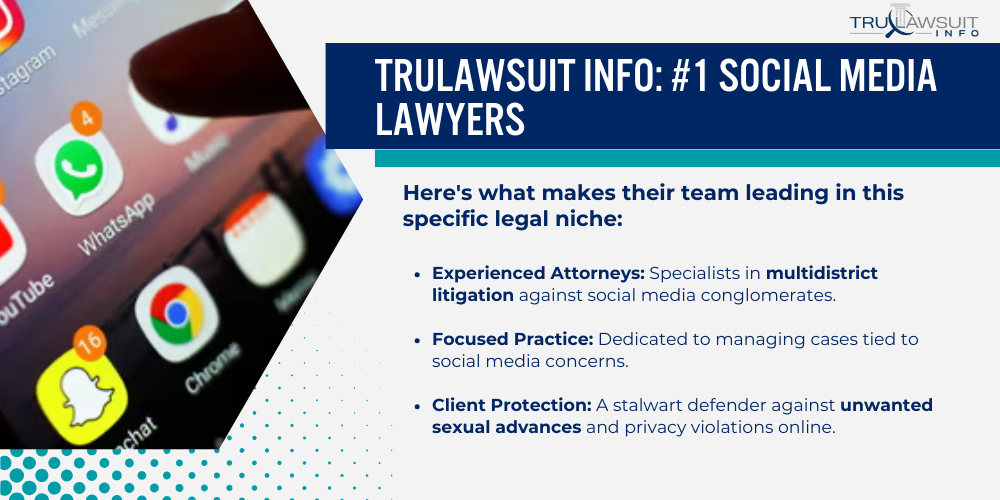
Trulawsuit Info stands out as a premier establishment specializing in legal battles centered around these digital landscapes.
Their focus on cases involving Facebook and other social media giants has set them apart as a formidable ally for those troubled by online conflicts.
Social Media Lawsuit experts at Trulawsuit Info tackle a plethora of challenging cases.
They are well-versed in representing clients against prominent figures such as Mark Zuckerberg and entities like Meta, Facebook’s parent company.
Here’s what makes their team leading in this specific legal niche:
- Experienced Attorneys: Specialists in multidistrict litigation against social media conglomerates.
- Focused Practice: Dedicated to managing cases tied to social media concerns.
- Client Protection: A stalwart defender against unwanted sexual advances and privacy violations online.
- Youth Advocacy: Commitment to safeguarding young users from harmful social media practices.
Their attorneys general have built a reputation for maintaining a neutral stance while delivering clear and convincing arguments in courts.
The legal strategies they employ are devised to effectively address the intricacies of social media law, providing a thorough defense or prosecution depending on the nature of the social media lawsuit.
The team at Trulawsuit Info has become instrumental in shedding light on the darker aspects of social media, acting as an essential support system for those who have become whistleblowers.
Their dedication to transparency and the relentless pursuit of justice have made them a beacon for clients navigating these turbulent waters.
Frequently Asked Questions
-
What legal actions have parents taken against social media companies for child safety?
Parents have initiated legal actions against social media companies, primarily focusing on the lack of child safety measures.
They often argue that the platforms fail to protect minors from exposure to harmful content and predators.
-
How many class action suits have been filed against social media platforms?
Since the number of class action suits against social media platforms is constantly changing, a concrete figure can fluctuate.
However, state officials have filed many lawsuits, ranging from data privacy breaches to content moderation practices.
-
For what reasons have whistleblowers sued social media companies?
Whistleblowers have sued social media companies for issues such as misuse of user data, unethical business practices, and failure to enforce their own policies.
These actions often bring to light questionable practices within social media corporations.
-
What have been the outcomes of recent high-profile social media lawsuits?
Recent high-profile social media lawsuits have sometimes led to significant financial settlements and, occasionally, to changes in policy and practice.
Corporations have been held accountable for privacy violations and corporate misconduct after these legal challenges.
-
Can individuals sue social media companies for data privacy breaches?
Yes, individuals can sue social media companies for data privacy breaches.
However, the success of such lawsuits often depends on the jurisdiction and the specific circumstances of the data breach.
-
What are the common allegations in lawsuits filed by whistleblowers against social media corporations?
The common allegations in these lawsuits include the platform’s mismanagement of user data, tolerating hate speech, and knowingly allowing the spread of misinformation.
Transparency in operations and ethical concerns are also frequent points of contention.

Experienced Attorney & Legal SaaS CEO
With over 25 years of legal experience, Jessie is an Illinois lawyer, a CPA, and a mother of three. She spent the first decade of her career working as an international tax attorney at Deloitte.
In 2009, Jessie co-founded her own law firm with her husband – which has scaled to over 30 employees since its conception.
In 2016, Jessie founded TruLaw, which allows her to collaborate with attorneys and legal experts across the United States on a daily basis. This hypervaluable network of experts is what enables her to share reliable legal information with her readers!
Have A Case?
Here, at Tru Lawsuit Info, we’re committed to helping victims get the justice they deserve.
To do this, we actively work to connect them with attorneys who are experts in litigating cases similar to theirs.
Would you like our help?
Tru Lawsuit Info is a reliable source of information about issues that may affect your health and safety, such as faulty products, data breaches, and environmental hazards.
Our team of experienced writers collaborates with medical professionals, lawyers, and advocates to produce informative articles, guides, and other resources that raise awareness of these topics.
Our thorough research provides consumers with access to reliable information and updates on lawsuits happening around the country. We also can connect consumers with attorneys if they need assistance.
Camp Lejeune's water contamination issue spanned several decades starting in the 1950s. Exposure to these chemicals has been linked to various serious health issues, including cancer, organ diseases, and death.
Research is increasingly suggesting a link between the use of Tylenol during pregnancy and the development of neurodevelopmental disorders, such as autism and ADHD, in infants.
Legal action is being taken against manufacturers of Aqueous Film-Forming Foam (AFFF), a chemical used in fighting fires. The plaintiffs allege that exposure to the foam caused health issues such as cancer, organ damage, and birth and fertility issues.
Have A Case?
Here, at Tru Lawsuit Info, we’re committed to helping victims get the justice they deserve.
To do this, we actively work to connect them with attorneys who are experts in litigating cases similar to theirs.
Would you like our help?







